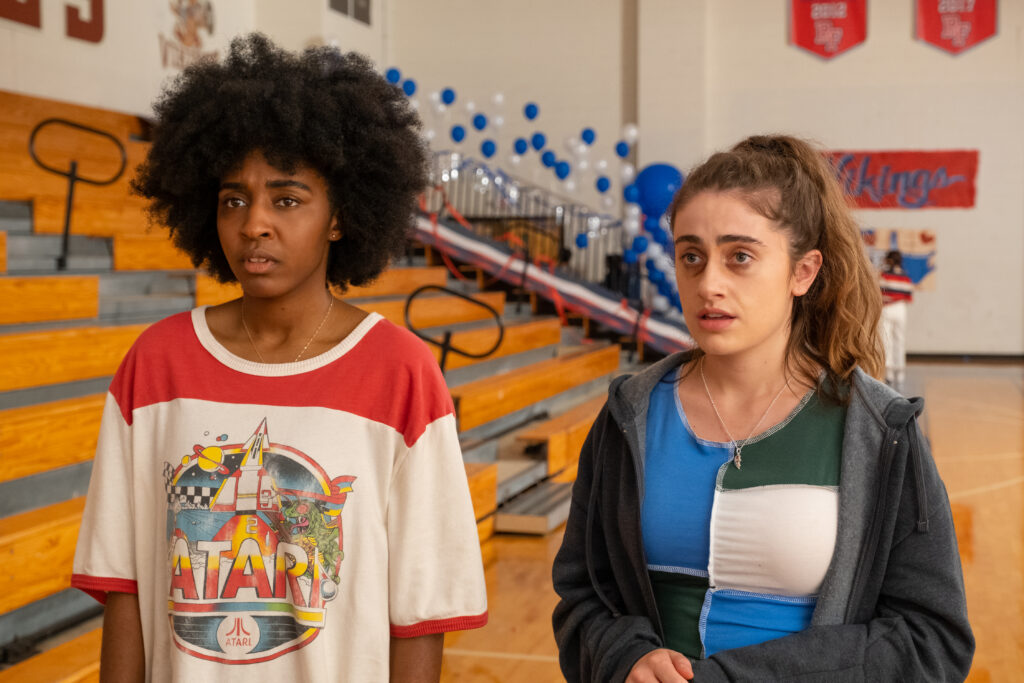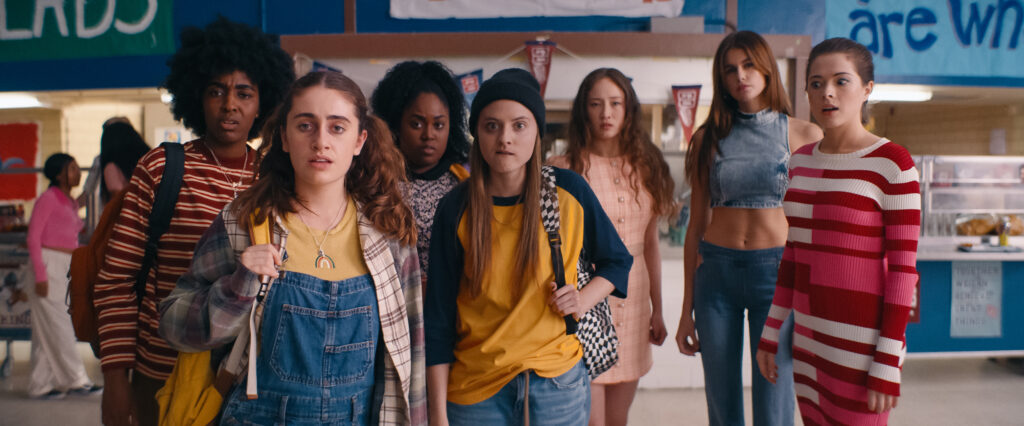August 24, 2023
by Carla Hay

Directed by Emma Seligman
Culture Representation: Taking place in an unnamed U.S. city, the comedic film “Bottoms” features an predominantly white cast of characters (with some African Americans and a few Asians and Latin people) representing the working-class and middle-class.
Culture Clash: Two lesbian best friends start an all-female fight club in their homophobic high school as a way to lose their virginities to cheerleaders.
Culture Audience: “Bottoms” will appeal primarily to people who are fans of the movie’s headliners and comedic movies where queer people are the central characters.

“Bottoms” is a bawdy and occasionally bloody comedy that gets gleefully absurd in this story about two lesbian best friends who start an all-female fight club in their high school. The originality outshines some of the film’s clichés. Even people who might not like “Bottoms” can admit that there are many things in this movie that have never been said and done before in a teen-oriented comedy.
Directed by Emma Seligman (who co-wrote the “Bottoms” screenplay with “Bottoms” co-stars Rachel Sennott), “Bottoms” had its world premiere at the 2023 SXSW Film & TV Festival. A distracting part of this movie is that the cast members portraying high schoolers look too old (early-to-mid 20s) to be in high school. It’s why all the movie’s raunchy dialogue isn’t as edgy as the “Bottoms” filmmakers probably thought it should be. However, because of the talented cast members, the delivery of this dialogue is entertaining, even if many parts of the movie require a huge suspension of disbelief, including the fact that all the cast members playing high schoolers are not really teenagers.
“Bottoms” takes place in an unnamed U.S. city but was actually filmed in Louisiana. The begins with lesbian best friends PJ (played by Sennott) and Josie (played by Ayo Edebiri) talking about sex. At this pont in time, PJ and Josie, who are both virgins, are students in their last year at Rockridge Falls High School. Their fantasies are to lose their virginities to the cheerleaders at the schools who are their biggest crushes.
PJ is hot for Brittany (played by Kaia Gerber), a tall beauty with a sarcastic attitude. (Gerber, who got her start as a model in real life, is the daughter of former supermodel Cindy Crawford.) Josie is infatuated with attractive Isabel (played by Havana Rose Liu), who is dating the school’s start football quarterback Jeff (played by ), a conceited, dimwitted pretty boy who is a chronic liar and cheater. Isabel and Brittany are best friends.
PJ is bossy and obnoxious, but she’s also hilarious and a generally loyal friend. Josie is more sensitive and thoughtful, but she’s also very insecure and plagued with self-doubt. In their conversations about losing their virginities, PJ is confident that it will happen to her before she graduates from high school. Josie thinks that if she has any chance of getting together with Isabel, it’ll probably be if they see each other at their 20-year high school reunion.
At school, PJ and Josie are outcasts because they’re lesbian and because people have heard that PJ and Josie both spent time in juvenile detention for violent crimes. Josie and PJ are often the targets of bigoted hate. Homophobic slurs are often spraypainted on their school lockers. Even the school’s sleazy leader Principal Meyers (played by Wayne Pére) doesn’t hide his homophobia.
There’s an incident where Jeff insults Josie, and she deliberately injures his leg while driving her car with Josie and Isabel as passengers. Principal Meyers calls Josie and PJ into his office and scolds them for injuring the school’s star football player. Rockridge Falls High School’s Vikings football team has been in a fierce rivalry for about 50 years with the Huntington High School Golden Ferrets. And there’s a big football game coming up between the Vikings and the Golden Ferrets
A story has been going around the school that a Rockridge Falls female student was attacked by a Hungtington male student. And so, when Principal Meyers tells PJ and Josie that they need to find a way to channel their “negative energy,” PJ comes up with the idea to start an all-female self-defense club at the school. (It’s really a fight club.) Principal Meyers says the club will be approved if PJ and Josie can find a teacher to be the sponsor/supervisor. PJ and Josie recruit their history teacher Mr. G (played by Marshawn Lynch), who has a hip-hop persona and is going through a divorce.
Josie is reluctant to go through with this fight club idea, but PJ convinces her by telling Josie that the fight club will be a way that they can find potential sex partners. Josie and PJ are thrilled when Isabel and Brittany end up joining the “self-defense club.” Other students are join the club, to varying results.
One of club members is Hazel Callahan (played by Ruby Cruz), who’s androgynous-looking and openly queer, is an even bigger misfit at the school than PJ and Josie, who try not to associate too closely with socially awkward Hazel. Also joining the club is Annie (played by Zamani Wilder), who is proud to be an African American member of the Republican Party. Other memorable supporting characters in “Bottoms” is Hazel’s frisky divorced mother Mrs. Callahan (played by Dagmara Dominczyk) and Vikings football player Tim (played by Miles Fowler), who is Jeff’s smirky sidekick.
The plot for “Bottoms” is fairly simple and a little bit on the formulaic side. However, the movie’s snappy dialogue and great comedic chemistry between the cast members (especially between Sennott and Edibiri) are definitely not formulaic and make this movie shine. Sennott also starred in Seligman’s feature-film directorial debut “Shiva Baby” (written by Seligman), a comedy/drama that was released in 2021 and re-released in 2023. There’s a final showdown in “Bottoms” that gets very over-the-top in its slapstick comedy. Ultimately, “Bottoms” won’t be a massive breakout for any of its stars, but it’s the type of movie that will get a very devoted following who won’t get tired of watching it.
MGM’s Orion Pictures will release “Bottoms” in select U.S. cinemas on August 25, 2023, with an expansion to more U.S. cinemas on September 1, 2023.
